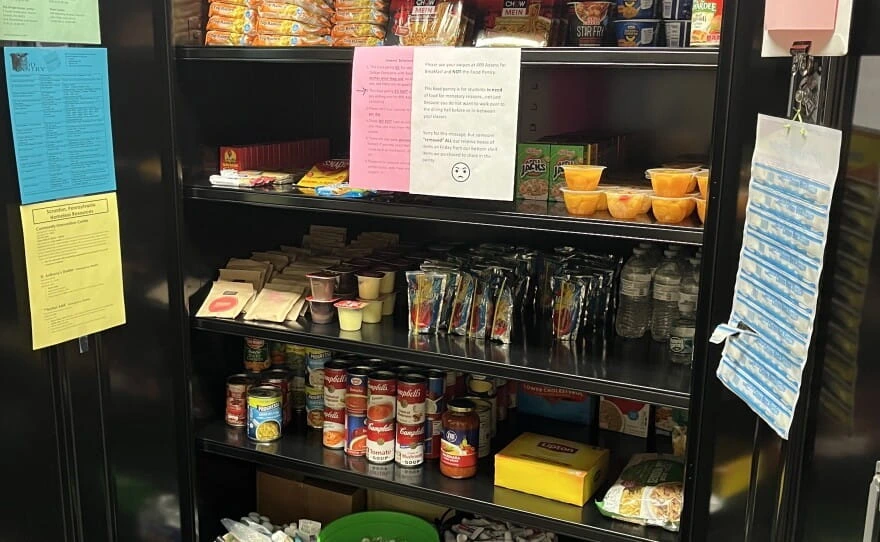Addressing Food Insecurity is a Priority for Some Local Colleges and Universities

Exam scores, assignment deadlines, final grades and internships are not the only stressors some college students face.
“Statistics out there that show 1/3 of college students struggle with [food] insecurities and potentially drop out of school,” said Dan LaMagna, Ed.D., Associate Vice President of Student Engagement at Lackawanna College. “We want to be able to take away that stress so they could focus on school, which is what they’re here for.”
The college in Scranton was one of 28 institutions of higher education and private licensed schools who received Hunger Free Campus grants from the state to combat food insecurity.
The former Office of the First Lady and the Department of Education began a Pennsylvania Hunger-Free Campus initiative to help provide for students. Of the $1 million set aside for grants, six colleges and universities in Northeastern and Central Pennsylvania were awarded a total of $200,000.
East Stroudsburg University (ESU) partners with St. Matthew’s Church on Ridgeway Street in the borough for its Warriors Pantry as well as other area pantries to help students in need.
With $40,000 in state funding, ESU will assess food insecurity campus wide. After the assessment is done, the university plans to create a social norming campaign to break down the stigmas surrounding food insecurity.
Bailey Higgins is a health and wellness case manager for the university. She works with a small population of students. Some have broken down in tears in her office over their lack of access to food. They dreamed of getting to college and graduating with a degree.
“Now … their dreams and their goals have become to open the refrigerator and find something to eat,” she said.
Lackawanna College received a $20,000 grant to help stock two food pantries for students.
In the past, different college offices would bring in meals for the students towards the end of semesters, said LaMagna. Then, Christine Kiehart, an associate professor and Director of Disability Services, started the first small food pantry in the college’s Angeli Hall.
With the grant, Lackawanna hopes to purchase a refrigerator to provide more fresh food options at their larger pantry in Healey Hall and provide nutritional education. The college is working with the nonprofit Chop Out Hunger to keep their pantries stocked with more canned vegetables, fruits, rice, noodles and potatoes and put up recipe cards.
“Donations are sometimes hard to come by or you get some donations, but maybe not all the foods and needs that the students may have,” LaMagna said. “So we we’re looking for that opportunity to expand, do more and not just offer food, but offer education and resources.”
Weekends and holidays can be tough for students facing food insecurity, LaMagna said. A pre-bundled food program is also in the works.
“The grant will help us provide during those critical times,” he said.
Food insecurity impacts students across majors, years of study and institutions.
The Geisinger Commonwealth School of Medicine (GCSOM) did not get a grant but has run a food pantry on campus. It’s run by the First Generation Support committee and Student Wellness, said Maya Van Gieson, a student leader and second year medical student.
The leaders take suggestions from students on what to stock and provide healthier options and food for all diets including vegans and vegetarians.
Van Gieson said food insecurity is overlooked when it comes to the college and postgraduate population. Students don’t have access to food the way they did during their K-12 years, she said.
“A lot of people believe we have … complete access to food,” she said.
The college put aside some funding for the food pantry and faculty and staff are also able to donate a portion of their salary to the pantry. Food left over from college events is also donated to the pantry.
The pantries at each of the schools do not have financial requirements to pick up food or even sign in sheets.
“A lot of times people might feel insecure about their food insecurity,” said Van Gieson.
Most pantries are centrally located and open to anyone.
“If you have a need or maybe you know somebody that hasn’t eaten … and you want to help out, you can utilize our food pantry,” LaMagna said. “So definitely growing, but I think there’s definitely a lot more awareness out there, which is a great thing.”
For more details or to donate to ESU, Lackawanna or GCSOM, visit https://www.esu.edu/food_pantry/index.cfm; https://www.lackawanna.edu/offices-and-departments/campus-life/ or https://www.geisinger.edu/gchs/education/departments/student-life/division-of-student-affairs
Other local grant recipients include: Johnson College, $20,000; Cedar Crest College, $20,000; Lehigh Carbon Community College, $40,000; and Commonwealth University, $60,000.
Read the original article written by WVIA News’ Kat Bolus
